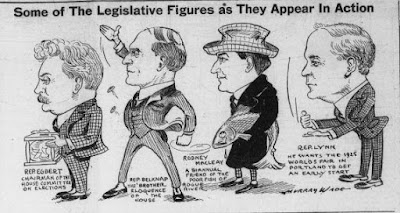Even though women had won the vote here in Oregon in 1912, they did not serve on juries. In 1921 Rep. Mary Strong Kinney introduced and shepherded successfully a bill to secure representation on juries in Oregon.
 |
| February 6th, 1921 |
Kinney had been born in Salem, a great-grandaughter of Tabitha Moffat Brown, graduated from Willamette in 1878, and married William Kinney in 1881. William ran the Salem Flouring Mill, and with a detour to Dayton shortly after the marriage they moved to Astoria and operated a sawmill.
 |
| Nov. 7th, 1898 |
She was widowed in 1898 (see also the Astorian for November 8th and William's record in the IOOF Pioneer Cemetery here) and ran the family mill thereafter.
 |
| January 26th, 1921 |
 |
| Feb. 2nd, 1921 |
 |
| Feb. 23rd, 1921 |
 |
| Feb. 23rd, 1921 |
On the 28th the papers reported Governor Olcott signed it into law.
Rep. Kinney had met resistance. A society column later said "The 'boys' tried to confuse Mrs. Kinney, but she was too quick for them." Earlier on the 23rd, Senator Strayer had called the bill an "asinine measure." If that's what he said publicly, you can imagine what he was saying in private!
 |
| March 3rd, 1921 |
Kinney was elected to the Senate for the next two sessions in 1923 and 25. She died in 1938 and is also buried in the IOOF Pioneer Cemetery, but not with her husband. During World War II she had a Liberty Ship named for her.
 |
| On the front page with the article on Jan. 26th she has no caricature and never got one in a month of them |
She deserves a longer history. She has a brief note at Wikipedia, no entry at the Oregon Encyclopedia, and is not mentioned in "Notable women throughout Willamette’s history" from 2017 at WU. It's fair to say she has not got her due as a Legislator or mill operator.


2 comments:
And a couple of footnotes...
WOU Historian Kimberly Jensen has a little more on the 1920 election at her blog, and a couple of better photographs of Kinney at OSU and at Pacific University.
I'm not going to research this closely, but it looks like Legislators also engaged in some passive-aggressive sabotage of the bill, choosing not to improve it and hoping minor flaws would sink it, then finally referring it to the voters. In the special election of June 1921, it barely passed, 59,882 for and 59,265 against.
Post a Comment